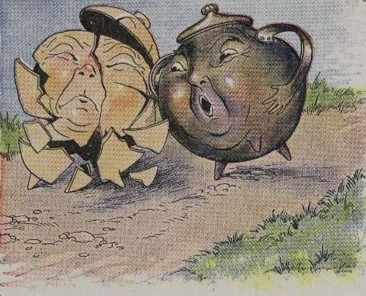The Book of Ecclesiasticus (c.200-175 BCE), also called the Wisdom of Sirach, is one of the disputed books of the Old Testament. It is included in the 2nd century BCE Jewish Septuagint (the Greek version of Jewish scriptures used by Diaspora Jews), but is not considered canonical in Judaism, only in Christianity. In it there is a piece of advice:
"Have no fellowship with one that is richer than thyself. What agreement shall the earthen pot have with the kettle? For if they knock one against the other, it shall be broken." [13.2-3]Is it possible that Sirach was a fan of the fables of Æsop (c.620-564 BCE)? Æsop has a Tale of Two Pots, one earthenware and one metal:
Two Pots, one of brass and the other of clay, stood together on the hearthstone. One day the Brass Pot proposed to the Earthen Pot that they go out into the world together. But the Earthen Pot excused himself, saying that it would be wiser for him to stay in the corner by the fire.
"It would take so little to break me," he said. "You know how fragile I am. The least shock is sure to shatter me!"
"Don't let that keep you at home," urged the Brass Pot. "I shall take very good care of you. If we should happen to meet anything hard I will step between and save you."
So the Earthen Pot at last consented, and the two set out side by side, jolting along on three stubby legs first to this side, then to that, and bumping into each other at every step. The Earthen Pot could not survive that sort of companionship very long. They had not gone ten paces before the Earthen Pot cracked, and at the next jolt he flew into a thousand pieces.The same story crops up again in the early Middle Ages in the fables of Avianus (5th century CE). In Avianus' version, two pots are floating downstream.* The metal pot suggests that they stick together, but the clay pot wants him to keep his distance, explaining "Whether the wave crashes me into you or you into me, in either case I will be the only victim."
The moral is that one should deal with equals; socializing (or going into business) with those above your station was risky. In cultures where society was sharply divided into different classes, this was advice worth repeating.
*Apparently, Avianus was fine with pots having a conversation, but walking on legs was too unrealistic for him!
